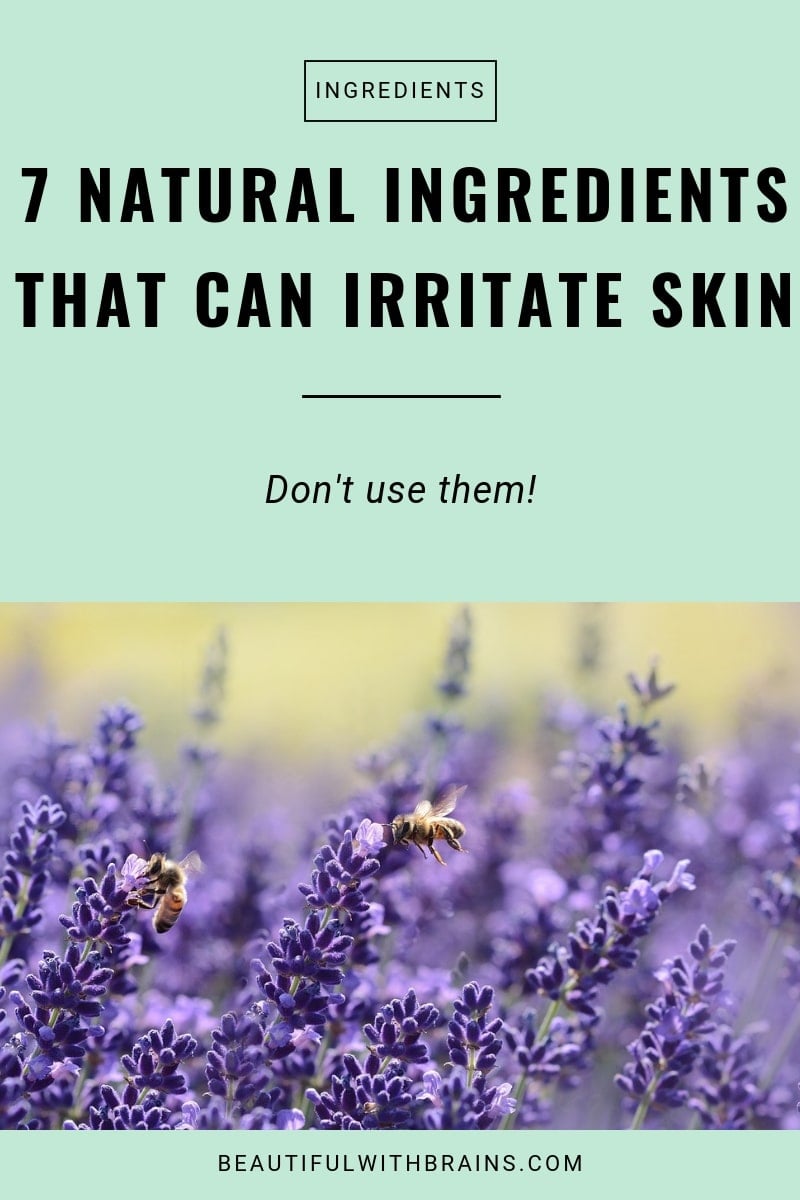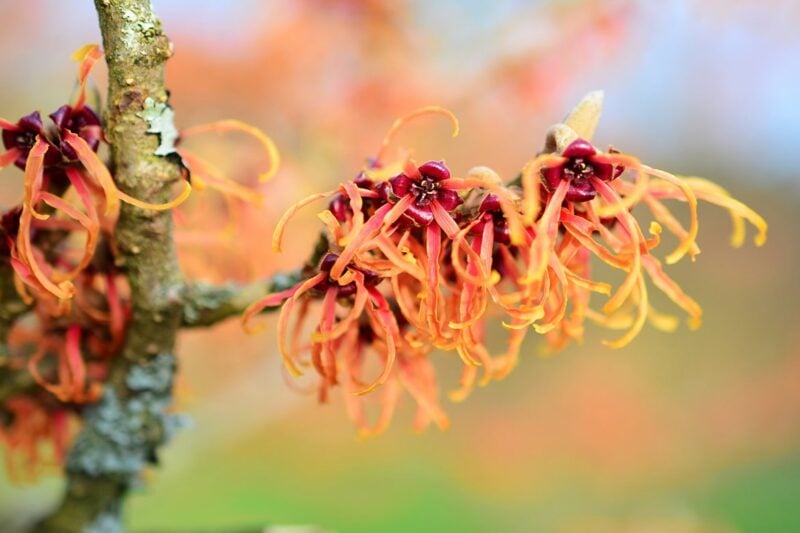
We waste so much time worrying about the wrong things.
We scream like women possessed at the mere sight of a spider (or is that just me?) yet we don’t hesitate to jump into a car to go wherever – guess which one is more likely to kill you?
We opt for fat-free foods and then drink three cans of soda a day – even though sugar is as bad as the worst types of fats.
We avoid mineral oil like the plague but don’t hesitate to use lemon juice to lighten our dark spots – and then wonder why our skin is all red and irritated.
Truth bomb: just because it’s natural, it doesn’t mean it’s good for you. Instead of making a fuss about all the synthetic things lurking in your cosmetics, start worrying about the irritating natural stuff that’s so common everywhere.
Yep. You’ve read that right. Irritating. Natural. Stuff. Natural ingredients can be irritating as hell, too. It’s not my personal opinion. Science agrees.
Here are seven irritating natural ingredients that science says have no business being in your skincare products:
NOTE: If your skin isn’t sensitive to these ingredients, you may be able to use them – in small concentrations – without problems. My point is: just because it’s natural, it doesn’t mean it’s safe.
1. Citrus-Derived Ingredients
My heart broke a little bit the day I learnt anything citrusy irritates skin *sighs*
Lemon. Orange. Bergamot… all the stuff that smells like a bright and glorious simmer day is bad for your skin.
When exposed to light and air, citrusy extracts and oils cause irritations and increase the risk of sunburns. When you apply them on your skin, you do expose them to light and air. There’s no getting around that. *sighs again*
Struggling to find skincare products that don’t irritate your sensitive skin? Download your FREE “Skincare Ingredients To Avoid” cheatsheet to find out what the most common culprits are and cut them out of your skincare routine:
2 & 3. Peppermint And Menthol
You know that lovely tingly feeling your lip balm gives you? That’s menthol (or another mint extract).
They feel so cool on your lips. But what they do to them ain’t cool. Anything mint is a counter-irritant.
In plain English, counter-irritants relieve inflammation in deeper tissues by inducing it locally. You’re just substituting one kind of inflammation for another. Not good.
By the way, that’s how lip balm or glosses make your lips bigger. Menthol and peppermint irritate the lips, swelling them up. It’s not a cool lip plumping trick. It’s irritation!
4. Lavender
Is there a body product that doesn’t smell like lavender these days? This trends needs to stop. And not just because lavender scents are SO boring.
Lavender contains linalyl acetate and limonene, two substances that oxidize when they come in contact with air. The more they’re exposed to oxygen, the higher the risk they’ll cause irritations and up the risk of sunburns.
Thanks, but no thanks.

5. Witch Hazel
I guess there’s a reason why witch hazel is called witch.
Like a witch, it has superpowers: it has both soothing and antioxidant properties.
But it also has a dark side. Or three:
- Tannins, the antioxidants in witch hazels, can irritate skin. That’s why, sometimes, manufacturers remove them from witch hazel. But then, what’s the point of using it?
- Witch hazel contains eugenol, another substance that can cause irritations.
- Witch hazel is usually distilled in alcohol. Alcohol can be drying and irritating, too.
This plant is just a mess. Stay away!
Related: Is Witch Hazel Good Or Bad For Skin?
6. Eucalypts
Do your skin a favour and leave eucalyptus to koalas.
There’s no scientific proof that eucalyptus oil does anything good for your skin.
But there’s plenty of proof that eucalyptus oil can cause contact dermatitis and allergic reactions.
Why use it?!
7. Chamomile
I bet you didn’t expect to see this here, did you?
If you’re thinking that chamomile is soothing and calm down irritations, you’re right. But then, why is it here?
Here’s the catch: chamomile is soothing for most people. BUT, if you’re allergic to any plants in the aster family, you’ll get an awful rash every time you put chamomile on your skin.
Related: Everything You Ever Wanted To Know About Chamomile In Skincare
The Bottom Line
Just because something is natural doesn’t mean it’s safe. Plants can cause allergies and irritations too. Be careful!






Great post Gio! I hate anything lavender scented, I don’t find the scent just boring like you do, I HATE it! lol ! x
Stavroula, lol. It’s really not that special, is it?
Hey, this is a good post! Most people don’t know about the photosensitivity that some natural products cause. However, there is some citrus that has had the photosensitive compounds removed. Bergamot that is FCF is one where they’ve removed the photosensitizer and citrus essential oils that are steam distilled instead of cold pressed also aren’t photosensitive as the photosensitive compounds are too heavy (at least that’s what I’ve read through research). Great points though thanks for this. 🙂
Krista, glad you enjoyed the post, and thank you for your comment, Good to know that not all citrusy ingredients are bad for you. 🙂
I thought you might be interested in this article about the lavender. http://roberttisserand.com/2011/08/lavender-oil-skin-savior-or-skin-irritant/
Thanks for the link. That was a very interesting link. I don’t think lavender oil will kill you, but it can definitely irritate your skin, which is the whole point of this post, as this study shows: http://www.ncbi.nlm.nih.gov/pubmed/18759894. In the end though, it all comes down to concentration, storage, and skin sensitivity.
I cringe when I’m looking for basic lip balm and all the ones on the shelf have peppermint, menthol, etc. Must be “good for you” right?? No one believes me either. So I end up with the same ones, usually. When I’m not going to be out or wearing lipstick, I’ve been using oil for lip balm. Almond, rose hip, olive – put into a tiny sample bottle.
(The other thing that’s hard to find is lip balm that has mineral sunscreen, but that’s a post for another day!)
DP, it’s so frustrating, isn’t it? Everyone seems to like menthol and peppermint, but they’re so bad for you! Using oils is a great alternative. They’re so moisturizing!
Hi, I would love to know what foundations are out there now without all the fruit acids, drives me nuts. I’m happy to just use a chemical one, less irritating. The body shop had a perfect foundation for years, not irritating at all the discontinued. Thank you, Jannine